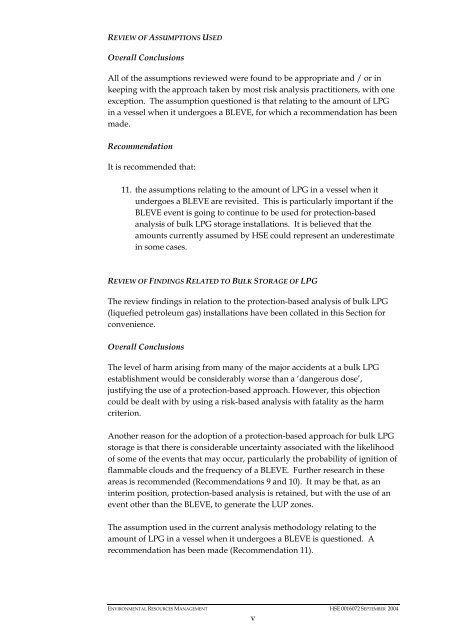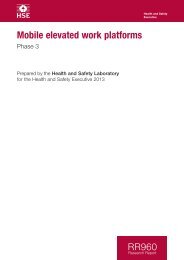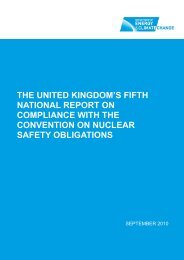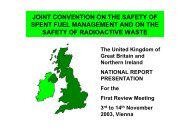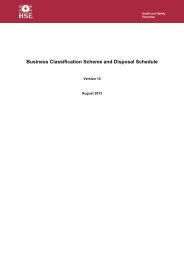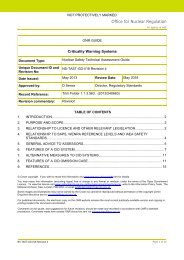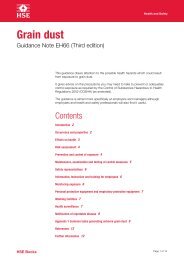A review of HSE's risk analysis and protection-based analysis ...
A review of HSE's risk analysis and protection-based analysis ...
A review of HSE's risk analysis and protection-based analysis ...
Create successful ePaper yourself
Turn your PDF publications into a flip-book with our unique Google optimized e-Paper software.
REVIEW OF ASSUMPTIONS USED<br />
Overall Conclusions<br />
All <strong>of</strong> the assumptions <strong>review</strong>ed were found to be appropriate <strong>and</strong> / or in<br />
keeping with the approach taken by most <strong>risk</strong> <strong>analysis</strong> practitioners, with one<br />
exception. The assumption questioned is that relating to the amount <strong>of</strong> LPG<br />
in a vessel when it undergoes a BLEVE, for which a recommendation has been<br />
made.<br />
Recommendation<br />
It is recommended that:<br />
11. the assumptions relating to the amount <strong>of</strong> LPG in a vessel when it<br />
undergoes a BLEVE are revisited. This is particularly important if the<br />
BLEVE event is going to continue to be used for <strong>protection</strong>-<strong>based</strong><br />
<strong>analysis</strong> <strong>of</strong> bulk LPG storage installations. It is believed that the<br />
amounts currently assumed by HSE could represent an underestimate<br />
in some cases.<br />
REVIEW OF FINDINGS RELATED TO BULK STORAGE OF LPG<br />
The <strong>review</strong> findings in relation to the <strong>protection</strong>-<strong>based</strong> <strong>analysis</strong> <strong>of</strong> bulk LPG<br />
(liquefied petroleum gas) installations have been collated in this Section for<br />
convenience.<br />
Overall Conclusions<br />
The level <strong>of</strong> harm arising from many <strong>of</strong> the major accidents at a bulk LPG<br />
establishment would be considerably worse than a ‘dangerous dose’,<br />
justifying the use <strong>of</strong> a <strong>protection</strong>-<strong>based</strong> approach. However, this objection<br />
could be dealt with by using a <strong>risk</strong>-<strong>based</strong> <strong>analysis</strong> with fatality as the harm<br />
criterion.<br />
Another reason for the adoption <strong>of</strong> a <strong>protection</strong>-<strong>based</strong> approach for bulk LPG<br />
storage is that there is considerable uncertainty associated with the likelihood<br />
<strong>of</strong> some <strong>of</strong> the events that may occur, particularly the probability <strong>of</strong> ignition <strong>of</strong><br />
flammable clouds <strong>and</strong> the frequency <strong>of</strong> a BLEVE. Further research in these<br />
areas is recommended (Recommendations 9 <strong>and</strong> 10). It may be that, as an<br />
interim position, <strong>protection</strong>-<strong>based</strong> <strong>analysis</strong> is retained, but with the use <strong>of</strong> an<br />
event other than the BLEVE, to generate the LUP zones.<br />
The assumption used in the current <strong>analysis</strong> methodology relating to the<br />
amount <strong>of</strong> LPG in a vessel when it undergoes a BLEVE is questioned. A<br />
recommendation has been made (Recommendation 11).<br />
ENVIRONMENTAL RESOURCES MANAGEMENT HSE 0016072 SEPTEMBER 2004<br />
v


